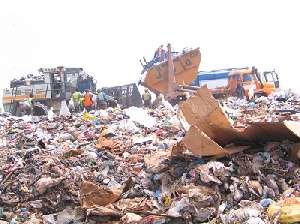Some operators of landfill sites in the country are threatening closure due to government’s inability to pay GH¢42million debt owed them.
The situation, according to the operators, has put them in the difficult position of not being able to service equipment required to manage the sites, and pay workers as well – hence, they are urging government to expedite processes to pay the owed debts, some of which date as far back as 2016.
“Currently, the landfill operators are owed more than GH¢42million by government. The inability of government to pay may force the operators to withdraw services due to inability to service equipment required for managing the landfill and to pay workers.
“We urgently call on government to pay all outstanding debts owed to landfill operators to ensure the efficient operation of these sites,” Vice Chairman of the Coalition of NGOs in Water and Sanitation (CONIWAS), Yaw Attah Arhin, has stated.
Mr. Arhin said this at the maiden Environmental Sanitation dialogue series organised by the Environmental Service Providers Association (ESPA) in partnership with CONIWAS.
The meeting forms part of the two organisations’ efforts to promote a sound and sustainable environmental sanitation advocacy campaign, and also engage the media to educate and create awareness on sanitation issues in the country.
Among other challenges faced by the industry, Mr. Arhin said, is lack of adequate infrastructure. He stated the need for expansion of infrastructure to deal efficiently with the country’s waste management issues.
“The current infrastructure capacity is fast being exhausted – if not already exhausted. Our visit to the Kpone Landfill (yesterday, 9th March) shows a facility that is being used beyond its installed capacity. The risk of going beyond 20 metres in height brings the possibility of a slide due to the unstable slopes. In view of the impending rainfall season and given the current state of landfills, waste service providers are in grave fear from the potential dangers of lacking suitable places to dump.”
He also noted that the country has only four landfill sites, adding that most of the waste produced in the country is collected and dumped in controlled and uncontrolled dumpsites due to the absence of adequate recycling and treatment facilities, and/or engineered landfills.
Beyond landfilling, the group also wants government to set realistic tariffs; as the current charges, they say, are lower that the World Bank recommended rate.
“The efficient collection of waste from households on weekly basis is affected by low tariffs and nonpayment of fees. Ghana charges less than US$10 for managing a tonne of waste, which is lower than the US$30 per tonne of waste recommended by the World Bank. All these coupled with high taxes such as VAT, import duties make it difficult for the companies to break-even,” Mr. Arhin added.
The associations also urged government to take the steps needed to establish a National Sanitation Authority to support in streamlining policies and policy directions in order to regulate and improve the water and sanitation sector.
General News of Wednesday, 11 March 2020
Source: thebftonline.com

















